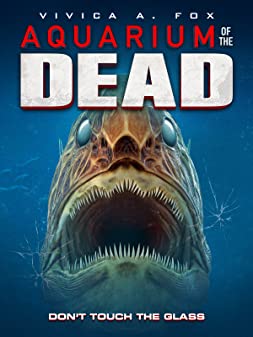Aquarium of the Dead
Aquarium of the Dead
The Aquarium of the Dead is a fictional concept often depicted in various forms of media, including movies, books, and video games. It typically refers to an aquarium or marine park that becomes overrun by reanimated or undead sea creatures due to a mysterious or catastrophic event.
Overview[edit | edit source]
In the context of popular culture, the Aquarium of the Dead serves as a setting for thrilling and suspenseful stories where visitors and staff must navigate the perilous waters teeming with zombified marine life. The concept combines elements of horror, science fiction, and survival genres to create a unique and engaging narrative.
Depiction in Media[edit | edit source]
The Aquarium of the Dead has been featured in several works of fiction, such as movies, TV shows, and novels. These portrayals often explore themes of fear, survival, and the unknown, as characters face off against undead sharks, octopuses, and other aquatic creatures within the confines of the once-peaceful aquarium.
Notable Examples[edit | edit source]
One of the most well-known depictions of the Aquarium of the Dead is in the film "Aquarium of the Dead," where a group of survivors must navigate the now-infested aquarium to uncover the source of the outbreak and find a way to escape. The movie received mixed reviews but gained a cult following for its unique premise and suspenseful atmosphere.
Cultural Impact[edit | edit source]
The concept of the Aquarium of the Dead has captured the imagination of audiences worldwide, inspiring fan theories, artwork, and even real-life events such as themed escape rooms and haunted aquarium experiences. Its blend of horror and aquatic elements continues to fascinate and entertain fans of the genre.
See Also[edit | edit source]
Search WikiMD
Ad.Tired of being Overweight? Try W8MD's physician weight loss program.
Semaglutide (Ozempic / Wegovy and Tirzepatide (Mounjaro / Zepbound) available.
Advertise on WikiMD
|
WikiMD's Wellness Encyclopedia |
| Let Food Be Thy Medicine Medicine Thy Food - Hippocrates |
Translate this page: - East Asian
中文,
日本,
한국어,
South Asian
हिन्दी,
தமிழ்,
తెలుగు,
Urdu,
ಕನ್ನಡ,
Southeast Asian
Indonesian,
Vietnamese,
Thai,
မြန်မာဘာသာ,
বাংলা
European
español,
Deutsch,
français,
Greek,
português do Brasil,
polski,
română,
русский,
Nederlands,
norsk,
svenska,
suomi,
Italian
Middle Eastern & African
عربى,
Turkish,
Persian,
Hebrew,
Afrikaans,
isiZulu,
Kiswahili,
Other
Bulgarian,
Hungarian,
Czech,
Swedish,
മലയാളം,
मराठी,
ਪੰਜਾਬੀ,
ગુજરાતી,
Portuguese,
Ukrainian
Medical Disclaimer: WikiMD is not a substitute for professional medical advice. The information on WikiMD is provided as an information resource only, may be incorrect, outdated or misleading, and is not to be used or relied on for any diagnostic or treatment purposes. Please consult your health care provider before making any healthcare decisions or for guidance about a specific medical condition. WikiMD expressly disclaims responsibility, and shall have no liability, for any damages, loss, injury, or liability whatsoever suffered as a result of your reliance on the information contained in this site. By visiting this site you agree to the foregoing terms and conditions, which may from time to time be changed or supplemented by WikiMD. If you do not agree to the foregoing terms and conditions, you should not enter or use this site. See full disclaimer.
Credits:Most images are courtesy of Wikimedia commons, and templates Wikipedia, licensed under CC BY SA or similar.
Contributors: Prab R. Tumpati, MD

